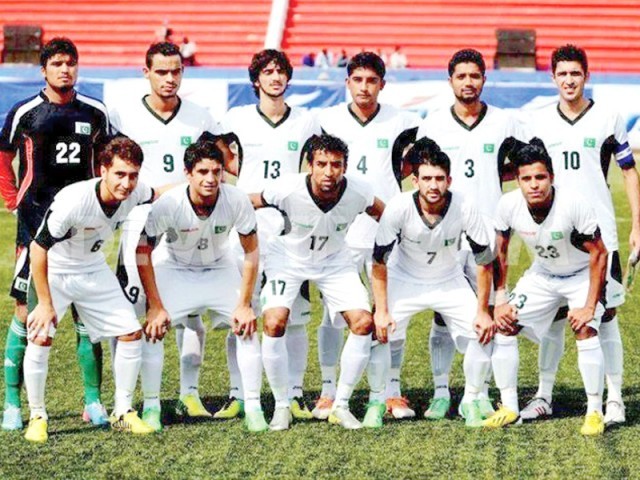By FPDC Staff
Pakistan ended another Asian Games football campaign with nothing to its name. Incheon 2014 saw Pakistan face North Korea and China in Group F. After North Korea hammered China 3-0 in the first game, Pakistan came next.
Despite having an extensive preparation tour for the U-23 tournament, which has no impact on our international rankings, Pakistan struggled against the quick and efficient Koreans as the latter dominated exchanges in the opening minutes. Pakistan appeared to be hoping to stem the early tide as its midfield, predictably, failed to control the tempo as the defence and goalkeeper Muzammil Hussain managed to block wave after wave of attacks.
However, young striker Mansoor Khan’s rash-tackling led to him being sent-off for 2 yellow cards by 37th minute and gave North Korea a penalty which they duly converted. After that it was all one-sided as Koreans tried to increase their 1-0 lead as Pakistan struggled with its 10 men. Eventually it became 2-0 after which the Koreans relaxed, knowing they had qualified for next round, and made substitutions without feeling any threat from Pakistan’s lone striker and captain Kaleemullah up front.
Now came the final game. Remarkably, due to slightly better goal difference, Pakistan had an outside chance of making the next round if it could avoid defeat against China. As easy as it sounded, China was not going to waste this chance and after some tense opening minutes, rifled into the lead with Pakistan’s defence over-stretched. The rest was usual as expected as Chinese midfield did not give Pakistan any respite with their quick passing and movements.
Had China gotten more shots on target they would have put the result beyond Pakistan much earlier. But knowing they were comfortable in possession and chances, the Chinese also relaxed and Pakistan, try as they might, simply did not have the quality to even score a single goal as they lost 1-0 and bowed out of the tournament with nothing to their name. The performance, at least not as humiliating as what Pakistan faced under Akhtar Mohiuddin in 2010 Asiad, once again posed the usual questions about a non-existent midfield and struggling defensive line against quality opposition.
But coaching staff and PFF officials were upbeat. Perhaps the reason of not losing by scores of 4-0 and higher, made them all gleeful and happy.
“In spite of conceding the goal, we dominated the first session. In the last ten minutes of the second half China opted for delaying tactics. We were on fire at that stage but luck did not favour us as we failed to capitalise on the opportunities,” Asghar told ‘The News’ from Incheon.
“For the first time in my life I have witnessed teams like North Korea and China playing cautiously against us,” he claimed.
Asghar said that the team delivered more than had been expected of it. “We did not qualify for the next round, but the spirited display of the boys against tough teams indicates that Pakistan have a bright future in football,” said Asghar.
“Today the team played really well,” PFF General Secretary Col. Lodhi told the News after Pakistan’s 1-0 loss against China. “I and Faisal Saleh Hayat watched the match and we were really impressed with the spirit of the boys. Although they did not score a goal, they were playing aggressively against a tough side,” said Lodhi.
However, the PFF deserves credit despite Shamlan’s charges failing to muster anything in Incheon. They sent the team on their expenses to the Asian Games for a second time in a row and the unprecedented exposure the side had before the event shows that the failure ultimately comes down to the coaching staff and their selection.
Coach Shamlan ignored all foreign-based players for the Asian Games and only took a meagre 17 players to South Korea, because the rest were unavailable and he hadn’t registered more players. Moreover, the constant exposure excuse given is nothing more than political statements.
Most of the squad including the likes of Mehmood Khan, Saqib Hanif and Ahsanullah have been constantly featuring in international games since 2010. So if they weren’t able to improve after four years, how will they become top players now?
And at the time of writing, the Bahraini is still adamant. His decision to exclude foreign-based players is undoing all the progress in 2013- where we recorded back-to-back wins after nearly four years and more importantly, started improving in terms of performances.
But that is of little value to coach Al-Shamlan, who is expected to use the same team in October when two international friendlies are planned against Palestine in Pakistan. Nothing new will be expected against the much improved and more ambitious Palestinians, who will play in the 2015 AFC Asian Cup after winning the last AFC Challenge Cup earlier this year, with its players both playing in Palestine and abroad.
PFF and Shamlan, on the other hand, insist on playing the same team that despite its extra extensive preparations failed to even score a goal in Asian Games and lacks the obvious quality to even compete well. One wonders if PFF will stick with this side for next few years and expect that it can somehow overcome its gaping faults and miraculously perform well enough in next year’s World Cup qualifiers to get into Asian Cup at least. By ignoring the quality players already available and eligible for Pakistan in Europe – and reluctantly using not more than 3-4 at a time – the coaching staff is not helping the team grow and learn.
International football is about selecting the best out there for your side, not about “exposure” trips to players who are still stuck with their departments in PPFL. If this continues, this team will end up facing a similar fate of getting wasted and burned out the way Salman Sharida’s famed 2006 team became by 2008 after it was smashed left right and centre by Middle East sides during the 2008 Olympics qualifiers.


